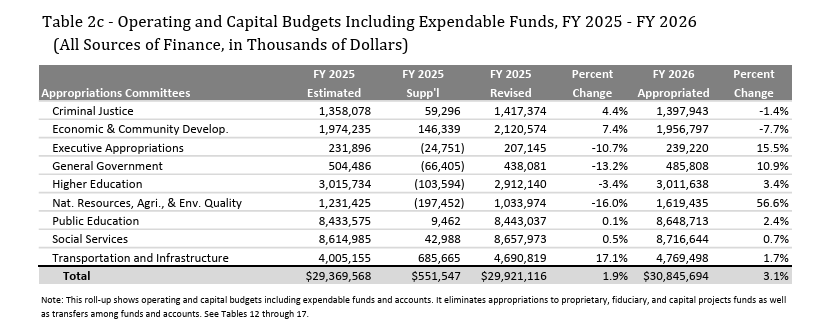The Legislative Fiscal Analyst’s (LFA) annual budget report for the State of Utah dates all the way back to the 1960s. That means that for the last 60 years we’ve provided a breakdown of the state’s budgetary acts to help you find the answers to what you’re looking for. Do you want to know how much the state budgeted for mental health programs in Fiscal Year 1977? We reported on it. Are you interested in finding out how much was appropriated to the Tax Commission for license plate production in 1991? We reported on it (and for those interested, it was $1,278,900). Budget reporting is in our bones, and like Rick Astley once said, we are never going to give it up.
This document is everything you’ve come to expect and love from our office: numbers, revenue, and appropriations shown in an ever-improving, accurate and reliable format. The report is broken into nine different chapters: one for each of the eight appropriations subcommittees and a statewide summary chapter that encompasses larger impacts from all the topical funding areas.
While BOTSU officially stands for the Budget of the State of Utah, we wouldn’t mind it being known amongst friends as the Best of the State of Utah. It’s a report that details budget actions that were taken during the legislative session, with the goal of providing a one-stop shop for those looking for intel into the funding acts of the legislature.
While the report itself is required by UCA 36-12-13 to be compiled every spring, analysts don’t publish the report in order to simply check off a statutory requirement. That’s not the LFA way. Budget staff want this report to be something readers can depend on for years to come as accurate, digestible information, no matter if you’re an elected official, a state agency, or a member of the public.
The BOTSU process begins immediately after the General Session comes to a close, and LFA drafts the report with our readers in mind, from the format of the budget tables to the online version we upload online. This year’s report boasts two new features: Table 2C (a.k.a, the subcommittee roll up) and improved listings for expendable accounts. Table 2C may look familiar to our customers who frequent the Compendium of Budget Information site, since it summarizes the information available there. With these two new additions, it’s easier to understand how BOTSU relates to other financial data published by the legislature.

As an office that is borderline addicted to fiscal improvements, LFA is already laying plans on how to improve next year’s edition of the Budget of the State of Utah. Specifically, staff are working with the Division of Finance on how to improve the relatability between BOSTU and the Utah Annual Comprehensive Financial Report (ACFR). A current barrier to cross walking these two reports is the method of cataloging budget areas (i.e. ‘subcommittees’ in BOTSU versus ‘activities’ in the ACFR).
BOTSU also does more than provide LFA with the opportunity to scratch the post-session itch for fiscal itemization. This report is used by the Governor’s Office and the Treasurer during their annual trip to New York to visit bond rating agencies. BOTSU assists the state in maintaining our highly desirable AAA bond rating (from Moody’s, Fitch, and S&P). Additionally, when the state issues a General Obligation Bond, (such as the $70.0 million authorized for the Department of Transportation in the 2025 General Session) credit analysts use information included in BOSTU to determine the state’s interest rates based on perceived risk. BOTSU includes information that assists the state in getting favorable terms for debt, such as Utah’s financial structure, current debt information, and balanced budget.
Now, would LFA really be doing their part in making this report easily accessible if they only made BOTSU available in its physical, beautifully bound book with hundreds of pages? Of course not! BOTSU can be found on budget.utah.gov. However, for those wanting to bury their nose in a rich retelling of the fiscal spending this past session, you’re in luck. If you would like a hard copy, contact the Office of the Legislative Fiscal Analyst (and remember, it makes a great gift).